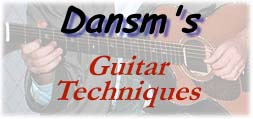 Fret-Hand Muting and Palm Muting
Fret-Hand Muting and Palm MutingMuting techniques are very useful for all guitarists, because they allow you to create a much wider variety of sounds without too much effort. Especially important are the percussive aspects that can be added to a piece using the muting techniques discussed here. There are two main types of muting that you will encounter in music: palm muting and fret-hand muting; I will discuss each separately because they are executed very differently.
Fret-Hand Muting
Fret-hand muting is widely used in all types of guitar music, but especially in electric rock. The technique is very simple and can add much variety to a passage. Fret-hand muting is indicated in tab notation by this symbol:
G D + + + + + + + + e:-3---3---x-x-x-x-|-2---2---x-x-x-x-| B:-3---3---x-x-x-x-|-3---3---x-x-x-x-| G:-0---0---x-x-x-x-|-2---2---x-x-x-x-| D:-0---0---x-x-x-x-|-0---0---x-x-x-x-| A:-2---2---x-x-x-x-|---------x-x-x-x-| E:-3---3-----------|-----------------|The
x indicates fret-hand muting on that string.The fret-hand muting indicated above is accomplished by allowing your fretting finger (or fingers) to touch the desired string lightly. Touch it enough to muffle the sound but not enough to fret the note. Then simply strike the strings as you normally would to create a percussive sound. You can play one string or multiple strings, strumming up or down, to get many different sounds.
The fret-hand muting notated above sounds like this:
87K wav file
As an example of fret-hand muting, I have a wave file and tab from the Van Halen song Take Me Back that you can check out.
Palm Muting
Palm muting is used in many types of guitar music. The technique is not difficult and adds variety to a passage. The palm-muting sound is different from fret-hand muting because in palm muting notes are fretted and played; they are simply muffled and not allowed to ring. This is the way metal bands like Metallica get their heavy, chunky sound. Palm muting can be indicated in tab notation simply by telling you where to use it; there is no real symbol for it.
G + + + + + + + + e:-3-------3-------|-3---------------| B:-3-------3-------|-3---------------| G:-0-------0-------|-0---------------| D:-0---0-0-0---0-0-|-0---------------| A:-2---2-2-2---2-2-|-2---------------| E:-3---3-3-3---3-3-|-3---------------| mute: [覧余 [覧余Notes indicated by
[覧余 are palm-muted.The palm muting indicated above is accomplished by keeping your picking hand pressed against the strings while you play. It is often easiest to place your hand close to the bridge when muting. The intensity with which you press depends on the sound you want. Everything is still fretted normally, but the fact that your hand is slightly muting the strings changes your sound. Usually, it is easier to accomplish palm muting with downstrokes. It may take a while to be able to pick and mute at the same time, so work at it and it will come to you.
The palm muting notated above sounds like this:
87K wav file
As an example of palm muting, I have a wave file and tab from the Stone Temple Pilots' song Plush that you can check out.
So that's muting. It's very useful and is used often, so learn it, practice it, and make good use of it. You can try it in electric music or acoustic music to give you a really cool percussive sound. Enjoy!
Back to Dansm's Guitar Techniques
You are visitor number
ゥ 1997 Daniel E. Smith. Last updated 12-7-97